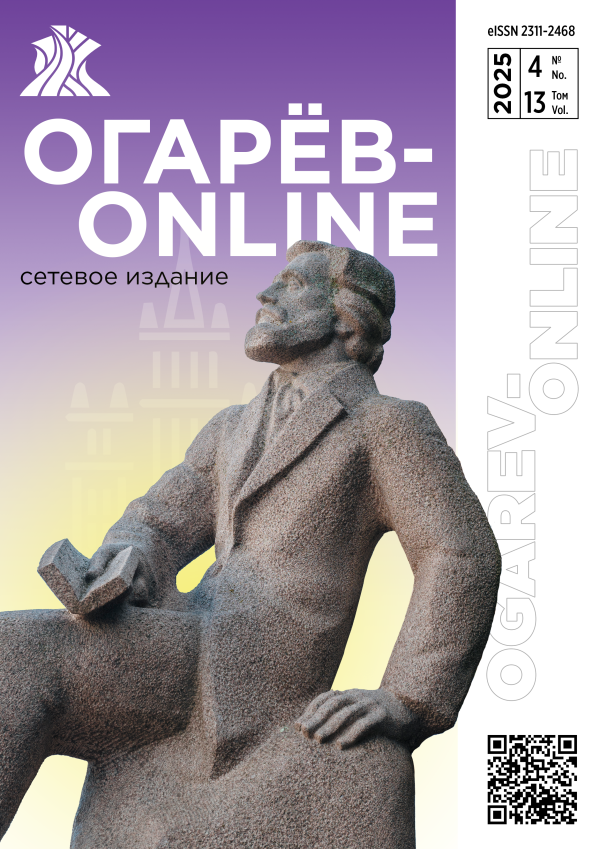Vol 8, No 12 (2020)
- Year: 2020
- Published: 15.10.2020
- Articles: 10
- URL: https://ogarev-online.ru/2311-2468/issue/view/18039
Full Issue
The Stylistic Aspect in Translating Songs from English into Russian
Abstract
This article deals with the issue of keeping stylistic devices in professional translations of songs. The author carries out a comparative analysis of songs written in English with their Russian translations in order to find examples of keeping and omitting stylistic devices and explain the translator’s decisions in both cases.
 2-7
2-7


Project Method as a Way of Enhancement of Students’ Cognitive Activity at Second Language Classes
Abstract
The article is devoted to the study of the role of the project method in the enhancement of students' learning and cognitive activity in mastering a second language. The author considers the essence and advantages of the project method, and the conditions for its successful implementation in secondary school practice.
 8-13
8-13


Linguistic Features of Using Graphic Means in the Novel “Theatre” by S. Maugham
Abstract
In the paper the author makes an attempt to assess the relevance of using graphons in the novel “Theatre” by S. Maugham, a classical English writer. The study is focused on the features of using graphons and the defining of the main functions of the graphical means in the novel.
 14-18
14-18


Key Features of G. B. Shaw’s Style: a Study of the Play “Pygmalion”
Abstract
The article presents the study of G. B. Shaw’s style in his play “Pygmalion”. The term “author’s style” and its correlation with the term “style” are considered in the article. As the main goal of the study the key lexical and grammatical features of G. B. Shaw’s individual style are identified.
 19-24
19-24


Nomination of Football Teams in English
Abstract
The paper considers the nominations of American and European football teams in English. The author provides an analysis of English sports articles published in online media, including pre-match and post-match reviews, and the interviews of players. As a result, the major trends in football teams’ nominations in the English language are identified.
 25-29
25-29


Differences in Use of English Pronouns Among Russian Students
Abstract
The article is devoted to the misuse of English pronouns among Russian students. On the basis of the students’ paperwork analysis the author exemplifies and classifies some groups of frequent errors into two categories: errors depending on the level of proficiency in English and errors common for all levels of English. As part of the study an attempt to establish general reasons for these errors is made.
 30-36
30-36


Stylistic Means of English Political Statements in Social Networks
Abstract
The paper considers the key features of the use of stylistic means in political statements posted in social networks. The author has analyzed the statements of English-speaking political leaders posted in the social network “Twitter”. As a result, the main stylistic means of morphological, lexical, and syntactic levels have been singled out.
 37-42
37-42


Psycholinguistic Aspects of English Advertising Text Formation
Abstract
The article deals with the features of the formation of the English advertising text in terms of the psychological impact on the recipients. The author studies the language means of informing, persuading, and motivating used in the English advertising text.
 43-50
43-50


English-Language Corpora for Error Analysis in Students’ Writing
Abstract
The article provides an overview of the theory of corpus-based error analysis. The authors suggest that the study of the nature of students' errors through examples from learner corpora and modeling relevant corrective exercises may reduce the percentage of subsequent errors. Practical tips for working with corpus resources for English teachers and students are offered.
 51-59
51-59


Syntactic Errors of Russian-Speaking Students When Writing English Texts
Abstract
The article is devoted to a comprehensive study of the syntactic errors made by Russian-speaking students when writing texts in the English language. The author draws special attention to the reasons that cause these errors. In this connection the similarities and differences between the syntactic systems of the Russian and English languages are analyzed.
 60-67
60-67
















